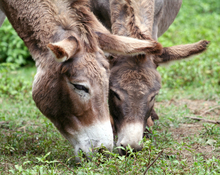An article published in Equine Veterinary Education points out that donkey's don't require the same level of nutrition that horses need. Because donkeys evolved as browsers eating shrubs and woody vegetation as well as grazers eating mainly grass and legumes, their digestive systems are able to handle highly fibrous forage that is lower in nutritional quality than what is required by horses.

Nutritional patterns in donkeys
Because donkeys evolved as browsers eating shrubs and woody vegetation, their digestive systems are able to handle highly fibrous forage lower in nutritional quality than what is required by horses, and they also require less water.
Mules share some of the nutritional pattern inherited from their donkey parents. As a rule, both donkeys and mules have significantly lower energy and protein needs when compared with horses. Feed management for these animals should be based on moderate-quality forage and hay, which will usually be sufficient for the majority of donkeys and mules, especially if they are performing little or no work.
Recently, the National Research Council of the Academies of Sciences published the 6th edition of the Nutrient Requirements of Horses. This edition included a chapter on Donkeys and Other Equids. This chapter summarized information published on the nutrition of donkeys largely based on studies conducted in Africa and Europe.
Donkey's unique morphological and physiological adaptations allow them to utilize foods that related species such as the horse cannot. donkeys are adapted to live in harsher environments and are able to subsist on a higher forage diet than horses and ponies. It has been reported that the nutrient and energy requirements for donkeys are in the order of 75% of those published for horses.
Donkeys also have lower water requirements per unit of body weight than other domesticated animals, horse included, with the exception of camels. They can conserve body water and avoid thirst by reducing sweating for thermoregulation and reduced fecal water loss. The amount of water consumed is influenced by the environmental temperature and humidity, the type of feed being consumed, the physiological status of the animal and the amount of work.
Except for those on an active exercise schedule, most donkeys and mules should be given only very small portions of grain, and most do not need any concentrate feeding at all. Because donkeys and mules tend to gain weight easily and are prone to obesity and related disorders, owners may also need to restrict access to pasture.
Use of grazing muzzles, dry lots, and periods of time in a stall can help to keep these equines from becoming too heavy.
